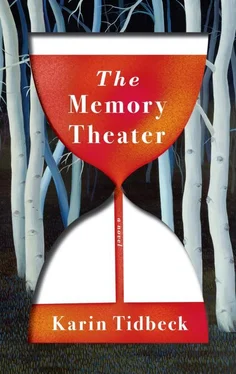“This is it,” Pinax said. “What do you think?”
Augusta plucked a scroll from a pile and examined it. The outside was covered in odd symbols. Pinax pried it out of her hands before she could unroll it, and put it back on the shelf.
“I’m missing something, aren’t I,” Augusta said.
Pinax made a small sound that Augusta couldn’t interpret. Perhaps frustration.
“Let’s go back upstairs,” they said, “and I will tell you the rest of the story.”
—
The queen had nightmares about fire.
In her dreams, fire ate its way through the library shelf by shelf, section by section. Night after night, she woke up screaming and rushed down to her books only to discover them unharmed, and the little guardians confused that she was in such a state. Her soothsayer interpreted her dreams as merely symbolic. The queen pretended to agree with him but still ordered a new section built into the library: a registry that also held copies of the greatest works in each section. The official purpose was to present the essence of the library. Not long after the new registry was completed, a runner came to inform her that a foreign army had crossed the border to their country.
The nation was old and had not been at war for a long time. It had relied on negotiation and good relations for centuries; its armies were trimmed down to a bare minimum.
We had seen wars before, but never had anyone tried to burn the library. Invaders had understood the value of knowledge. These new enemies had no respect for literature. To them, destroying thousands of years’ worth of knowledge was a strategic act. They rushed across the country, leaving burning temples and ruined monuments in their wake.
The queen was inside the library when they came. The soldiers forced the doors open and poured inside. They drenched the shelves in oil and set their torches to them. Fire devoured dry wood and vellum and paper. Keepers screamed in terror as they perished with their works. The queen donned her helmet and spoke to me.
“If anything can be saved, Keeper,” she told me, “let it be the knowledge of what was once here. Protect our memory.”
—
Pinax poured themself some more tea. Augusta sat very still.
“Some keepers escaped,” they said. “The keeper of plays, for example. They live on. And then there’s me.”
“You,” Augusta said.
“Yes. I was the keeper of the registry. That’s what my name means. I took what remained of the library and made a little world to keep it safe. But it is so much work to maintain. What happened to the rest of the library is catching up. So, slowly but surely, the room is getting hotter. The fire outside, the fire in the burning library a long time ago, is trying to get in.”
Pinax sipped from their cup. “I don’t know if I myself will survive. I am a genius loci; my life is tied to a place. And that place is burning down. I have built new homes in various places over the years and brought the little pocket universe with me. I thought perhaps time and distance would make it easier, that it would somehow weaken the bond between my stolen room and the rest of the library. And so I ended up here, in this cold country.”
“You created a world within a world,” Augusta said.
Pinax nodded. “I did. It just took words, and will. As the Keeper, I knew every book in the library. I knew the spells and incantations to build and protect such a place.” They pointed at her with the cup. “Just like you did, once upon a time.”
“I did?”
“Your society did. Phantasos and Mnemosyne sought me out. I lived in Paris in those days, but I was not unknown among those with mystical knowledge. Your colleagues traveled all the way from this town to ask me how to create a world. I taught them.”
“Ah,” Augusta said.
“You created the Gardens through a mutual agreement that it be separate from Earth,” Pinax continued. “It would be perfect, innocent, unravaged by the passage of time, like the Arcadia of myth. When you started asking questions about time, Augusta, you risked the existence of that place. That is why Mnemosyne cast you out.”
Augusta felt like her chest was shrinking.
“And it was for the best,” Pinax said. “You created a world of your own, and you lost yourselves in it. Phantasos described it to me. He said that you grew senile, then mad. That you forgot who you were and why you had chosen to create the Gardens. He said he was sick of ruling a nation of idiots.”
“Where is he?” Augusta asked. “Tell me. Help me find him.”
“Phantasos?” Pinax looked at her. “Are you ready for that?”
“Look at me,” Augusta said. “It has been a month, and I’m growing old.” She drew a finger from her right nostril to the corner of her mouth. “Here. See?”
Pinax’s mouth was a line. “There are answers in the library, but you are not ready.”
“You promised,” Augusta said. “I have done everything you said.”
“I promised nothing,” Pinax replied. “It has only been a month.”
“I’ll die of old age before you tell me anything!” Augusta shouted.
There was nothing for it. She stormed out.
—
That night in a dream, Augusta stood with others in a circle around three divans. They were in the conservatory; moonlight shone down on them through crystal panes. She recognized Euterpe, Walpurgis, Tempestis, Cymbeline, Virgilia, the rest. Their clothes were less elaborate than they should be. Their unpainted faces looked smooth and very young. Augusta’s heart swelled to see them. She loved them. It was love.
On the three divans sat the Aunts, hands resting on their thighs. Behind them stood Mnemosyne and a man Augusta didn’t recognize. He was slight, with fair hair falling in perfect ringlets around a pointed face. He looked around the circle, and for a moment his eyes bored into Augusta’s.
Mnemosyne and the man joined hands, and the lords and ladies in the circle began to chant, long words with soft consonants and open vowels. This is our land, the words meant. Our pure and innocent land. Time is no more. Only this blessed night, in Arcadia, forever.
The chant ended. The Aunts lay down as one. A shudder went through the air.
“Time,” Mnemosyne said into the silence, “has stopped. We are free. Let us cast off our old lives. Let us forget the old world and be innocent.”
Then they were in the statuary grove, dancing to a slow and uneven rhythm. Mnemosyne and the man sat on a dais before them, watching.
Augusta sat in her bower. A servant put makeup on her face. They smiled at each other. The brush was cold against her lips. She was bored. The servant’s skin was smooth. Why should not the servants be adorned? Let us paint the servants. Flowers for their names.
They danced in the statuary grove, but it was like moving through muddy water. The wine tasted sour.
A croquet game on the grand lawn. Someone fell. Breaking glass. Blood spilled down a servant’s shirt. The arterial red cut through the dullness like a shout. Such a pretty shade. Why should not the servants bleed? Flowers for their names.
They danced in the statuary grove. The man stood up and left the dais.
They danced in the statuary grove.
They danced in the statuary grove.
They danced in the statuary grove.
“So,” Nestor said, “it’s time you explain why you searched us out.”
Thistle and Dora sat with Director and Nestor on the stairs to the house on wheels. Apprentice was clearing the dirty dishes away, and Journeyman was organizing costumes in the armoires. Director and Nestor shared a hookah, making watery burbles and puffs of cherry-scented smoke. They had all been noisy for a long time now. They were talking back and forth, quick and chittering like birds. The babble closed over Dora’s head like water, pressed at her from all sides. It was getting very hard to keep up, but Thistle did the talking and replied to Nestor’s question.
Читать дальше










![Карин Тидбек - Аматка [ЛП]](/books/438406/karin-tidbek-amatka-lp-thumb.webp)

